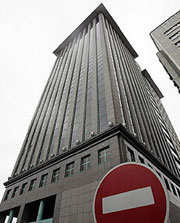|
 |
| Headquarters of oil giant Yukos
in Moscow.(AFP) |
A little-known Russian company has bought the main production unit of
oil giant Yukos at auction in Moscow.
Baikal Finance Group outbid
favourite Gazprom, the state-controlled gas monopoly, to buy
Yuganskneftegas.
Baikal paid 260.75bn roubles ($9.37bn: £4.8bn) for Yugansk - nowhere
near the $27bn Russia says Yukos owes in taxes.
Yukos reacted immediately by repeating its view that the auction was
illegal in international and Russian law, and said Baikal had bought
itself trouble.
"The company considers that the victor of today's auction has bought
itself a serious $9bn headache," said Yukos spokesman Alexander Shadrin.
He said the company would continue to make "every lawful move" to
protect tens of thousands of shareholders in Yukos from "this forcible and
illegitimate removal of their property".
Meanwhile, Tim Osborne, head of Yukos main shareholders' group Menatep,
said that Yukos may have to declare itself bankrupt, and that legal action
would be taken, outside Russia, against the auction winners.
Reports from Russia say Baikal has paid a deposit of nearly $1.7bn from
a Sberbank (Savings Bank) account to the Russian Federal Property Fund,
for Yugansk.
The sale came despite a restraining order issued by a US court dealing
with the firm's bankruptcy application for Chapter 11 protection.
Yukos has always insisted the auction was state-sponsored theft but
Russian authorities argued they were imposing the law, trying to recover
billions in unpaid taxes.
There were originally four registered bidders , and with its close ties
to the Kremlin, state-backed gas monopoly Gazprom had been seen as
favourite.
But just two companies turned up for the auction, Gazprom and the
unknown Baikal Finance Group, named after a large freshwater lake in
Siberia.
And, according to Tass news agency, Gazprom did not make a single bid,
leaving the way open for Baikal, which paid above the auction start price
of 246.75bn roubles.
Mystery firm Baikal Finance Group is officially registered in the
central Russian region of Tver, but many analysts believe it may be linked
to Gazprom.
Kaha Kiknavelidze, analyst at Troika Dialog, said: "I think a decision
that Yugansk should end up with Gazprom was taken a long time ago. So the
main question was how to structure this transaction.
"I would not exclude that the structure of the deal has slightly
changed and Gazprom now has a partner.
"I would also not exclude that Baikal will decline to pay in 14 days,
that are given by law, and Gazprom is then recognised as the winner. This
would give Gazprom an extra 14 days to accumulate the needed funds.
"Another surprise was that the winner paid a significant premium above
the starting price."
However, Gazprom has announced it is not linked to Baikal in any way.
And Paul Collison, chief analyst at Brunswick UBS, said: "I see no
plausible explanation for the theory that Baikal was representing
competing interests.
"Yugansk will most likely end up with Gazprom but could still end up
with the government. There is still potential for surprises."
Yugansk is at the heart of Yukos - pumping close to a million barrels
of oil a day.
The unit was seized by the government which claims the oil giant owes
more than $27bn in taxes and fines.
Yukos says those tax demands are exorbitant, and had sought refuge in
US courts.
(Agencies) | 